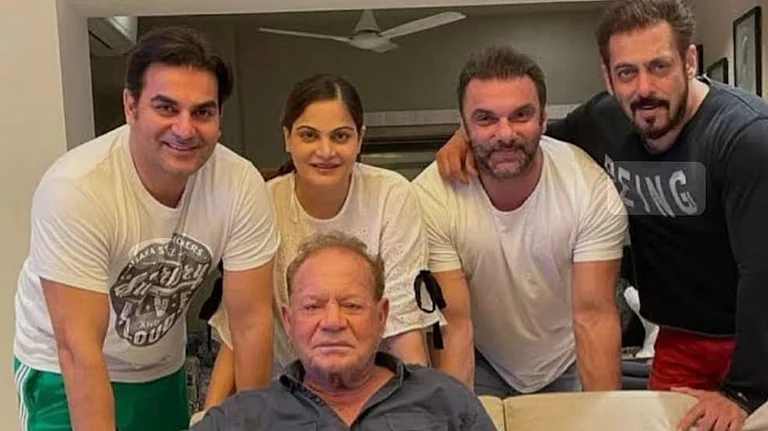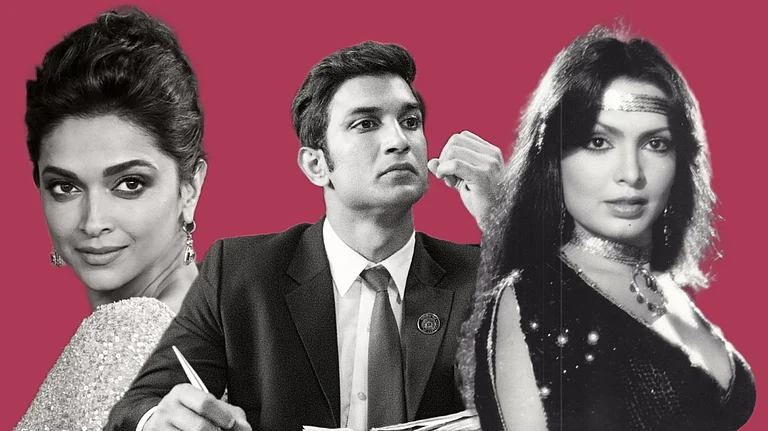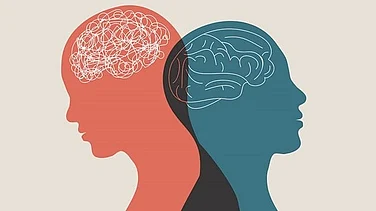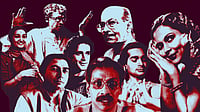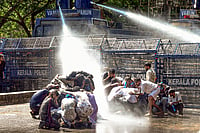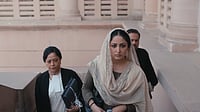
Summary of this article
Conversion therapy is one among the many issues impacting the mental health of LGBTQIA+ persons.
Despite the National Medical Commission asserting in 2022 that it can be counted as professional misconduct, it remains rampant.
For queer communities, peer counselling is an important intervention.
Rishi was in her late teens when she had her heart broken. As it often happens in love, passion and care flourished in abundance between her and her partner at the beginning. Eventually, however, he wanted to move on and marry a woman. Having encountered disappointment with the man of her dreams, Rishi thought of turning to the only other man she hoped to find solace in—her father.
“I wanted to hug my father and cry,” says Rishi, now 22 and based in Coimbatore. “I was undergoing severe depression. So, I went and told him, ‘I only want to remain your child. I don’t want to get married.’ I trusted him to comfort me.” Unfortunately, that was not to be. Rishi’s father decided to get her ‘cured’ for her heartbreak. “When I asked him why he was taking me to a psychiatrist, he told me that I’m depressed due to sleep deprivation.” That’s how Rishi was compelled to embark on the horrific journey of “conversion therapy”.
It has been more than three decades since the declassification of homosexuality as a “disease” within the global psychiatric discourse. While the American Psychiatric Association removed homosexuality as an illness from the second edition of its Diagnostic and Statistical Manual (DSM) in 1973, the World Health Organisation removed homosexuality as a mental disorder from its International Statistical Classification of Diseases and Related Health Problems (ICD) in 1990.
However, the Indian medical infrastructure dragged its feet in depathologising queerness. It was only in 2018 that the Indian Psychiatric Society issued a statement categorically clarifying that homosexuality is not a disease. It further went on to state that “there is no scientific evidence at all that attempts to convert a person’s orientation succeed in any manner”, urging that any therapy in this direction be stopped immediately. In a significant move to protect persons of the LGBTQIA+ community from psychological harm, the National Medical Commission—India’s highest regulatory body of medical professionals—asserted in 2022 that conversion therapy can be counted as professional misconduct, with instructions to all State Medical Councils to take disciplinary action against medical practitioners who indulge in such activities.
Irrespective of these landmark steps, the practice continues to be rampant across various states in India. Conversion therapy can entail a wide range of (falsely-claimed) “treatment” —from psychotherapy and hypnotherapy, to aversive conditioning, electroconvulsive therapy (ECT) and medication. The prevalence of this deeply traumatic procedure stems from the ingrained stigma around queerness in the society, leading to the pathologisation of sexual orientation as a mental illness—not just by family members of queer individuals, but also by many in the medical fraternity.
When Rishi’s father took her to see a psychiatrist, she was made to sit blindfolded in a cab and asked to trust his judgement. It almost felt like abduction. “Between November and December 2022, I was taken to this doctor twice. The first time, the doctor asked me if I liked pink. I said yes, and described various shades of the colour that I liked. This made him retort, ‘Pink is a colour liked by women. I only asked you if you liked it, and you have gone on to list the shades to me!’” Rishi says. The doctor went on to ask her to describe how she saw women and men. Rishi told him that while she liked the kind of clothes women wear, she finds men attractive. Considering her responses and her feminine voice, the doctor assumed that Rishi is a transgender person.
“Eventually, the doctor prescribed a colourless, odourless medicine to me, which my father compelled me to have. Any questions about the medicine would mean that I’d be beaten black and blue,” she says. Rishi was extremely bright and sharp in her studies. But having the medicine started making her feel drowsy, unable to focus on any activity. She got in touch with Sivakumar TD, a community worker with the South India AIDS Action Programme (SIAAP), about it, and they offered to get it checked by another doctor for her. “But I loved and trusted my father. Hence, I didn’t want it checked back then,” Rishi says. “After a week, I decided to throw it away, but I knew my father was noticing. He started insisting that I consume it before him. So, I secretly started switching the medication with water. This, I went on to have in front of him for nearly one and a half months.”
On being taken to the doctor blindfolded again for a second consultation, Rishi understood that honest responses would mean more medication, more assault. This time, she decided to lie. “When the doctor asked me if I go around with any men, I told him that I went to watch movies with my male friends. I went on to fabricate stories about these friends sending me porn films, which I enjoyed. That’s when the doctor responded with satisfaction, saying, ‘Now you have completely become a man!’” Rishi’s father was recommended by the doctor that she be allowed to interact with men more often and go on trips with them. However, being the household’s primary caregiver, Rishi was not allowed any such luxuries from his end.
“The problem was not so much my father, as this doctor,” she says. “My father was unaware of the ideas of gender and sexuality. But this psychiatrist was well educated, wasn’t he? Yet, he made false promises to my father saying that medicines can cure homosexuality.” Rishi believes that if the doctor would have recommended accepting the child as she is, perhaps, things would have been different. “Doctors hold an important position in the society. Even if something goes wrong with a child, the parent doesn’t blame the doctor; they believe that their own child is at fault. However, children still continue to have faith in their parents, even if they are treated wrongly.” Though Rishi’s father passed away last year and his mother and sibling have been more supportive about her non-binary identity ever since, she can’t help but wonder about the breach of faith she experienced with the psychiatrist. “What if this was his own child?” she asks. “Would he still do such a thing?”
Sivakumar, the SIAAP volunteer who assisted Rishi, says that conversion therapy is one among the many issues that impact the mental health of queer persons. While being subjected to such a dehumanising exercise can lead to actual long-term mental problems such as depression, coercive actions by families that misgender queer individuals can also be detrimental to their state of mind. “I once came across an adult self-identified Muslim trans-man from a Southern District in Tamil Nadu, who was being forcefully detained against his will and kept naked in a room in his house. They refused to give him clothes so he wouldn't step out of the house,” says Siva.
“When such issues happen even to those over the age of 18, it becomes especially difficult for queer individuals to report any such incidents of abuse or mistreatment by their families if they are below the age of 18. This is because their families don't understand the situation of a gender non-conforming child and upon reporting abuse, they are forced to leave their families and live in hostels, which again are segregated on the basis of gender.” Furthermore, many from the queer community struggle with finding consistent partners even after 40 to 50 years. There is immense loneliness from the scarcity, which is why they continue with troublesome relationships even if a partner is toxic. In such circumstances, romantic failures can often lead to suicides.
Siva highlights that volunteers like them become even more vulnerable to assault and harassment, when they try to intervene in situations where members of the community are in need of assistance. “There have been many occasions when people have chased and tried to kill me. I have even experienced harassment by the police, or those associated with the police, when I have been on the way to make any intervention in such incidents. The toll of handling both cases like these and the police harassment is huge,” Siva says.
Though there are landmark judgements that have made a difference—such as Justice N Anand Venkatesh’s intervention in the case of S Sushma and Ors vs Commissioner of Police at the Madras High Court in 2021—the path towards freedom from discriminatory practices for queer people continues to be ridden with roadblocks. “The issues are not just on the outside. Within the community itself, discrimination is quite prevalent,” says Siva. “For instance, I’ve witnessed how trans-men are labelled as lesbians by other queer community members.” When individuals who are already marginalised by the society and their families experience such forms of discrimination, they end up in double jeopardy.
Delfina Kanchana Sundar, another member of the SIAAP LGBTIQA+ Project Team, believes that mental health issues cannot be addressed by clinical practice alone; what is also needed is a psychosocial support structure. “We don’t think of mental health in a holistic manner,” they say. “In my opinion, the bigger problem is not infrastructure, but attitude. Personally, I believe that an exclusive identitarian approach is a problem. When we approach mental health professionals as ‘queer affirmative/inclusive’, there is an implication that the rest of medical training can be allowed to be queer exclusive.” Considering that individuals can be vulnerable across the axes of class, caste and gender, they say that there can be no way to protect one demographic alone.
Delfina was subjected to severe bullying and ragging in their childhood and youth—so much so, that they refused to go to college out of fear, and chose to join distance education instead. In a bid to find a space where they felt understood, Delfina also spent a lot of time trying to engage with Hindu missionaries. “I spent nearly two-and-a-half years at an ashram because I was attracted to their lofty ideas about transience of name and form. They claimed that the human body doesn’t matter and is maya, which led to my misplaced notion about finally finding a space which I would be able to relate to. But their dogma showed that bodies did matter. The ashram itself was strictly gender-segregated and my discussions with women on spirituality became a huge issue for them.” This disillusionment left them completely disappointed and they started seeking work in various professions, before landing up with a full-time consultancy (documentation and technical support) role at SIAAP.
“When I started associating with different community groups, I seriously began to think about self-identity,” they say. But ‘talk therapy’ was not something they could find any connection with. It was when they were introduced to the Sterling School of Playback Theatre and the Indian Institute of Psychodrama that they found resonance in these therapeutic art forms. “Expressive Arts Therapy, particularly Psychodrama, was more suitable for me than Cognitive Behavioural Theory or psychoanalysis. It allows for roleplay in various timelines—revisiting the past, reworking on the present, or exploring a future projection,” Delfina says. With playback theatre, they found a space between art and therapy that allows for and values spontaneity and creativity. This participation was an immense mental boost for them because they finally managed to find a community that was inclusive and supportive.
Delfina believes that psychiatrists hold the power to fundamentally transform people’s lives. “Psychiatric evaluation is rightfully needed, for instance, before a queer person undergoes gender transition. However, their role is only to rule out any active psychopathological issues in the individual, not arbitrate their decision-making process.”
MORE FROM THIS ISSUE
They assert that for queer communities, peer counselling is an important intervention. The SIAAP LGBTIQA+ team organises such training programs for members of the queer community, facilitated by trainers like Magdalene Jeyarathnam. When asked how they take a call on whether a case can be resolved simply through psychosocial support or if the individual needs therapy, they say, “It’s best to do a cost-benefit analysis of treatment.”
According to them, if an individual feels the need for and can afford professional therapy, then they should go for it by all means. But in situations where they can’t, peer counselling can be a useful alternative. However, in situations where there is any expression of intent of self-harm, it is best that the individual is immediately referred to a mental health professional. Delfina’s understanding is that addressing mental health issues cannot be a piecemeal endeavour. It necessitates a careful evaluation of every aspect of the individual’s identity and social position. As they aptly point out, “You cannot effectively treat an ailment in one part of the body, while remaining indifferent to the other parts.”
Apeksha Priyadarshini is Senior Assistant editor, Outlook. She writes on cinema, art, politics, gender & social justice.
In its August 21 issue, Every Day I Pray For Love, Outlook collaborated with The Banyan India to take a hard look at the community and care provided to those with mental health disorders in India. From the inmates in mental health facilities across India—Ranchi to Lucknow—to the mental health impact of conflict journalism, to the chronic stress caused by the caste system, our reporters and columnists shed light on and questioned the stigma weighing down the vulnerable communities where mental health disorders are prevalent. This copy appeared in print as 'Fifty Shades Of Pink.'





